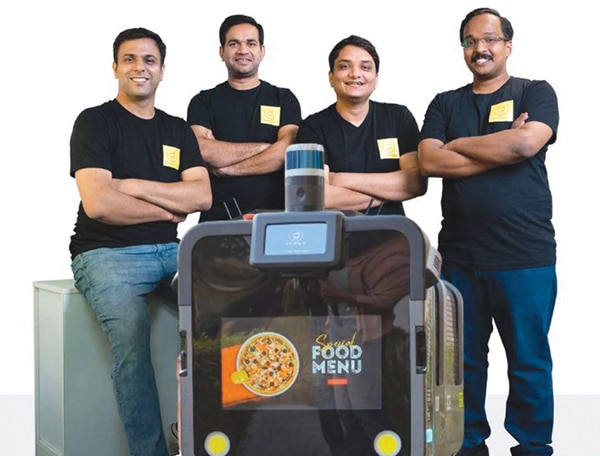Within three years, Ottonomy has created a stir across the globe with its Made-in-Noida robots for North American, European, Middle Eastern, and Japanese markets.
Founded in 2020 by Ritukar Vijay along with Pradyot Korupolu, Ashish Gupta, and Hardik Sharma, the Santa Monica, California-based robotics startup Ottonomy.IO offers fully autonomous delivery robots on a robotics as a service (RaaS) model for hyperlocal last-mile delivery services.

The young entrepreneurs, who manufacture robots in India for global customers, began their journey in 2011-2012, focusing on unmanned ground vehicles. Later, they dabbled with mobile robots for manufacturing and warehousing. Recognising the challenges in hyperlocal deliveries, the startup combined its knowledge from autonomous vehicles and warehousing to address labour shortages in the last-mile delivery market.
The second version of the robot, Ottobot 2.0, comes with modular delivery bins, customisable capacity-volume size, a navigation engine that merges data from lidar and cameras, and a new four-wheel drive ‘crab mode’ system for extra manoeuvrability in tight spaces. Co-founder and CEO Ritukar Vijay says, “Our underlying technology is centred on non-GPS-based autonomous mapping, localisation, and navigation. A crucial aspect is achieving seamless transitions from indoor to outdoor settings, particularly essential for hyperlocal deliveries.
The robots use high-information mapping of the serviceable delivery areas to navigate and reach the consumer delivery locations. The robots collect a unique QR code from the customer to unlock the hold area and retrieve the order once they reach their destination. Existing charging infrastructure is utilised for recharging, with partners handling battery charging and maintenance, with support provided by Ottonomy.
Vijay says that the most innovative feature that sets the startup apart from its competitors is the specific drive train employed by the robot, with all four wheels powered and capable of simultaneous steering. “Coupled with tailored algorithms, the drive train proves crucial in optimising navigation in tight spaces, a significant challenge with slightly larger robots. This design also enables customisation of compartments based on specific needs, whether a single large compartment for groceries or multiple compartments for package deliveries, resembling a locker on wheels,” he explains.
Vijay says that the startup has been focusing on adapting to diverse regional behaviours, strategic customer acquisition, and integrating artificial intelligence in real-time decision-making in the industry. He adds that the behavioural variations in different regions present a significant challenge during real-time deployment.
To deal with these challenges, Vijay explains, “From Q2 to Q4 in 2022, we conducted deployments in 13 locations globally, gaining valuable insights into user behaviours and preferences across different demographics. We leveraged our software stack to adapt robot behaviours based on location and utilised AI algorithms to learn from these behaviours. Despite the success in different environments, managing and predicting the expected behaviour of the robot remains an ongoing and intriguing challenge.”
Delving deeper into the usage of AI, Vijay explains that, apart from driving real-time decision-making within the robot, an overarching AI layer learns from the cumulative experiences of a fleet of robots over time, including metrics such as how often robots encounter edge cases, delivery hotspots depicted in heat maps, and trajectory patterns. “This approach encompasses real-time decision-making, cumulative fleet impact assessment, and strategic integration of AI in various processes,” he says.
The startup secured pre-seed funding from industry individuals, including former Tesla and Apple employees. In a seed funding round last year, led by Bengaluru-based Pi Ventures, the startup secured an investment of $3.3 million as funding. Founder and CEO of Noida-based Addverb Technologies, Sangeet Kumar, also joined the round.
With a manufacturing facility in Noida under its India-owned subsidiary, Ottonomy has successfully deployed 50 robots till now, conducting autonomous deliveries at airports, universities, casinos, and large areas within casino premises in North America (Cincinnati Airport), the Middle East, and Europe (Rome International Airport). The oldest deployment is currently functional at Cincinnati Airport. The startup has signed contracts worth $3.5 million till now, with deployment numbers projected at 150-200 robots in total by the end of this financial year.
Vijay says the company aims for strategic customer acquisition for long-term scalability to significant numbers—ranging from 6000 to 10,000 to even 20,000 robots. “The focus is on acquiring customers with the capacity and vision to deploy a substantial fleet in the next three to four years,” he concludes.








